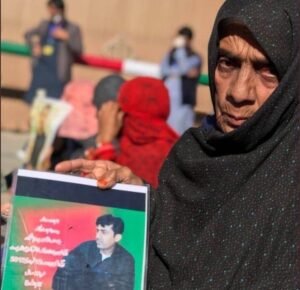Violence against children in Pakistan: A persistent scourge despite efforts

Photo by @AADIL for ADN
By Shabir Sadiq
Violence against children continues to be a deeply entrenched issue in Pakistan, despite tireless advocacy by activists, interventions from non-governmental organizations (NGOs), and various government initiatives.
Across the country, countless children endure physical abuse, sexual exploitation, forced labour, and neglect—pervasive forms of violence that compromise their well-being, safety, and future prospects.
While efforts to combat this issue have been made, the persistence of cultural norms, socioeconomic inequalities, and weak institutional frameworks perpetuates the problem, making it one of Pakistan’s most pressing human rights challenges.
Pakistan ranks among the countries with the highest rates of violence against children globally.
According to reports from the United Nations Children’s Fund, or UNICEF, and local organizations, millions of children in Pakistan are subjected to abuse and exploitation annually.
This includes physical abuse in homes and schools, sexual violence, child marriage, trafficking, and forced labour in industries like brick kilns, agriculture, and domestic work.
The problem is compounded in rural areas, where poverty and illiteracy leave children even more vulnerable to mistreatment.
Physical violence is disturbingly normalised in many settings, with corporal punishment widely accepted as a means of discipline in homes, schools, and workplaces.
In a 2020 study, over 70 percent of Pakistani children reported experiencing physical punishment in educational institutions, despite the fact that corporal punishment is officially banned in schools.
Additionally, sexual abuse cases remain alarmingly high.
In 2023 alone, over 3,800 cases of child sexual abuse were reported in Pakistan, according to Sahil, an NGO dedicated to child protection.
However, due to stigma and fear, many cases remain unreported, suggesting that the real numbers are far higher.
Deep-rooted cultural norms and societal attitudes play a significant role in perpetuating violence against children.
Many communities view physical punishment as a necessary tool for instilling discipline, with parents and teachers believing it to be their duty to “correct” children through force.
Similarly, in conservative rural areas, child marriage is often seen as a way to secure a child’s future or relieve families of financial burdens.
In 2021, an estimated 18 percent of Pakistani girls were married before the age of 18, according to UNICEF. These harmful practices are often justified in the name of tradition or religion, making it difficult to challenge them.
Barriers to Child Protection in Pakistan
Efforts to address these issues face resistance not only from communities but also from local leaders, who may see external interventions as threats to cultural autonomy.
Poverty and lack of education are key drivers of violence against children. In a country where nearly 40 percent of the population lives below the poverty line, economic hardships force many families to send their children to work instead of school.
The International Labour Organization (ILO) estimates that approximately 3.4 million Pakistani children are engaged in child labour, many of them subjected to hazardous conditions and exploitation.
Education, which could serve as a tool to break the cycle of violence, is inaccessible to a large portion of the population. According to the Pakistan Education Statistics Report 2021-22, over 22.8 million children aged 5 to 16 are out of school, representing 44 percent of this age group. Without education, children lack awareness of their rights and remain trapped in cycles of abuse and poverty.
The Pakistani government has taken several steps to address violence against children, including the implementation of child protection laws and policies.
Key legislative measures include the Criminal Law (Amendment) Act of 2016, which increased penalties for sexual abuse, and the Zainab Alert, Response, and Recovery Act of 2020, which established mechanisms for addressing cases of child abduction and abuse.
Despite these efforts, enforcement remains weak. Corruption, lack of training for law enforcement agencies, and insufficient resources for child protection services hinder the implementation of these laws.
Moreover, Pakistan’s judicial system often fails to deliver timely justice, further discouraging victims and their families from seeking help.
The government has also partnered with NGOs and international organisations to launch awareness campaigns and child protection initiatives.
Programmes like the National Commission for Child Welfare and Development (NCCWD) and provincial child protection bureaus aim to provide support services for vulnerable children.
However, these programmes are often underfunded and lack the reach to effectively address the scale of the problem. NGOs and activists have played a crucial role in combating violence against children in Pakistan.
NGOs Tackling Child Violence
Organizations like Sahil, Edhi Foundation, and SPARC (Society for the Protection of the Rights of the Child) have been at the forefront of providing shelter, counselling, and rehabilitation for abused children. They also work to raise awareness, advocate for policy changes, and train communities on child rights.
Despite these contributions, NGOs face significant challenges, including funding constraints, resistance from conservative elements, and lack of cooperation from local authorities.
Many activists working on sensitive issues like child sexual abuse also face threats and harassment, further complicating their efforts.
Violence against children remains a deeply entrenched issue in Pakistan, undermining the country’s progress toward a just and equitable society.
While activists, NGOs, and government initiatives have made strides in addressing this problem, systemic challenges and cultural barriers persist.
Shabir Sadiq (pseudonym) is a researcher specializing in Pakistan’s education system.
Note: The contents of the article are of sole responsibility of the author. Afghan Diaspora Network will not be responsible for any inaccurate or incorrect statement in the articles.










